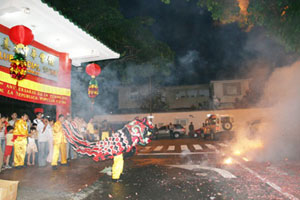


|
|
Militant/Argiris Malapanis
|
| October 1 celebration outside Chinese Social Club in El Bosque neighborhood in Caracas, Venezuela, marks 57th anniversary of China’s 1949 revolution. |
"The celebration draws Chinese from throughout the city," said Fermina Li, secretary of the Chinese Association of Caracas, which sponsors the annual event.
"This day is a matter of pride for many Chinese immigrants here and many of us of Chinese descent," Honey Liu Lin, a 23-year-old law student born here of Chinese parents, told the Militant. "It's a way to stand up for our culture and identity and say no to anti-Chinese prejudice that was prevalent in the past and continues to exist today."
The celebration included traditional music, a poetry reading, and performances with martial arts and Chinese dragons, which drew cheers from the audience, especially the dozens of children present.
A colorful and loud welcome was given to officials of the Chinese embassy on the street outside the club, with firecrackers and traditional dragon dances.
Almost all those attending were Chinese. They ranged from restaurant and grocery store owners to professionals and waiters, cooks, and other workers. Many frequent the club for social affairs. The center is also the site of a farmers' market on Sunday mornings, where people sell produce often grown in their gardens, Li said. A good number of people at the event were recent immigrants who primarily spoke Chinese.
"Immigration from China is growing," said Kawa Cheang, who works for CANTV, the main government-sponsored communications network. "Even more are expected next year, when technicians and others are coming to work on projects of PDVSA," the state-owned oil company.
Cheang and others said this immigration is largely due to recent trade deals between Caracas and Beijing, which have substantially increased since the government headed by President Hugo Chávez took office in 1998.
According to figures released by the Chinese embassy in September, trade between the two countries grew from $1.4 million in 1974 to $2.1 billion last year. The same source estimates Beijing's capital investments here at $2 billion, with Venezuela being the top country for Chinese investment in Latin America.
During Chávez's trip to China in August, the two governments announced new economic agreements. These include plans for Beijing to build computer manufacturing plants in Venezuela, a large order of oil tankers for PDVSA to be built in China, and increased exports of Venezuelan oil to China.
One sign of this cooperation is the growing number of Venezuelan military and government personnel and professionals who are learning Chinese, said Honey Liu. Along with her colleagues Sofía Xu and Kelly Jiang, Liu teaches Chinese to a number of them, she said.
The three also teach Mandarin at the School of Chinese Languages, located in the Chacaito neighborhood here on the floor above the Grand King Chinese restaurant. Some 80 Venezuelan-born students, many of whom attended today's celebration, take classes there for a nominal fee, "so we can keep our language alive," Liu said.
Liu was born and raised here and lived in China for two years to learn the language. Xu arrived five years ago, while Jiang came this year and is now learning Spanish.
"At school and work we don't face much discrimination," Liu said. "But on the street it's not uncommon to hear, 'Go back to China.' There's resentment that Chinese people have jobs or own stores. But we don't cause unemployment."
Recent immigrants are often forced to pay exorbitant fees to get residency papers, Xu said.
Anti-Chinese prejudice, however, was much stronger in the past, said Hai Tung Chang, 75, director of the Chang Gallery, which specializes in Chinese artifacts. Chang also offers free classes in the Cantonese dialect and gives lectures on the history of Chinese immigration to Venezuela.
"There are at least 120,000 Chinese in Venezuela today," said Chang. "About 35,000 live in Caracas, where there are 450 Chinese restaurants and 200 Chinese grocery stores. Chinese communities exist in Valencia, Barquisimeto, Maracaibo, and other cities."
The first Chinese immigrants arrived in Venezuela from Cuba in 1856, Chang said. Thousands more were brought to this country as indentured slaves by the English and other colonialists, many of them through Trinidad and other British colonies in the Caribbean, in the second half of the 1800s. "Many were later expelled," he said.
In Cuba, Chinese immigrants fought in the 19th century wars for independence against Spanish colonialism, Chang said. "That didn't happen here, because when the Chinese were brought as slaves Venezuela was already independent."
Immigration began to increase after 1949, when the capitalist regime of dictator Chiang Kai-shek was overthrown in the revolution that established the People's Republic of China, Chang said. "But it was slow because of restrictions under Mao, which were eased in the 1970s. Then Chinese immigration to Venezuela grew. And anti-Chinese prejudice remained widespread."
"There is one country in the region where we are treated differently," said Liu, during a discussion with Militant reporters on the book Our History Is Still Being Written: The Story of Three Chinese-Cuban Generals in the Cuban Revolution. The book describes how anti-Chinese discrimination was ended in Cuba as a result of the socialist revolution there. "In Cuba we know the Chinese are respected," she said.
Front page (for this issue) |
Home |
Text-version home